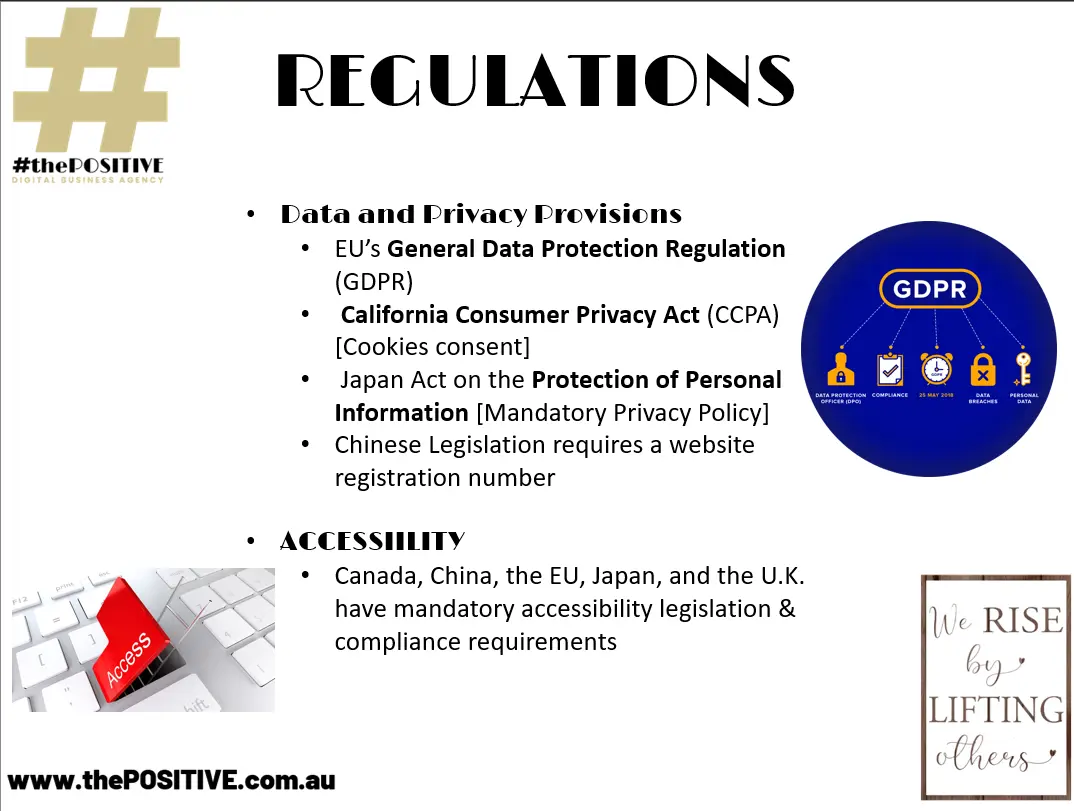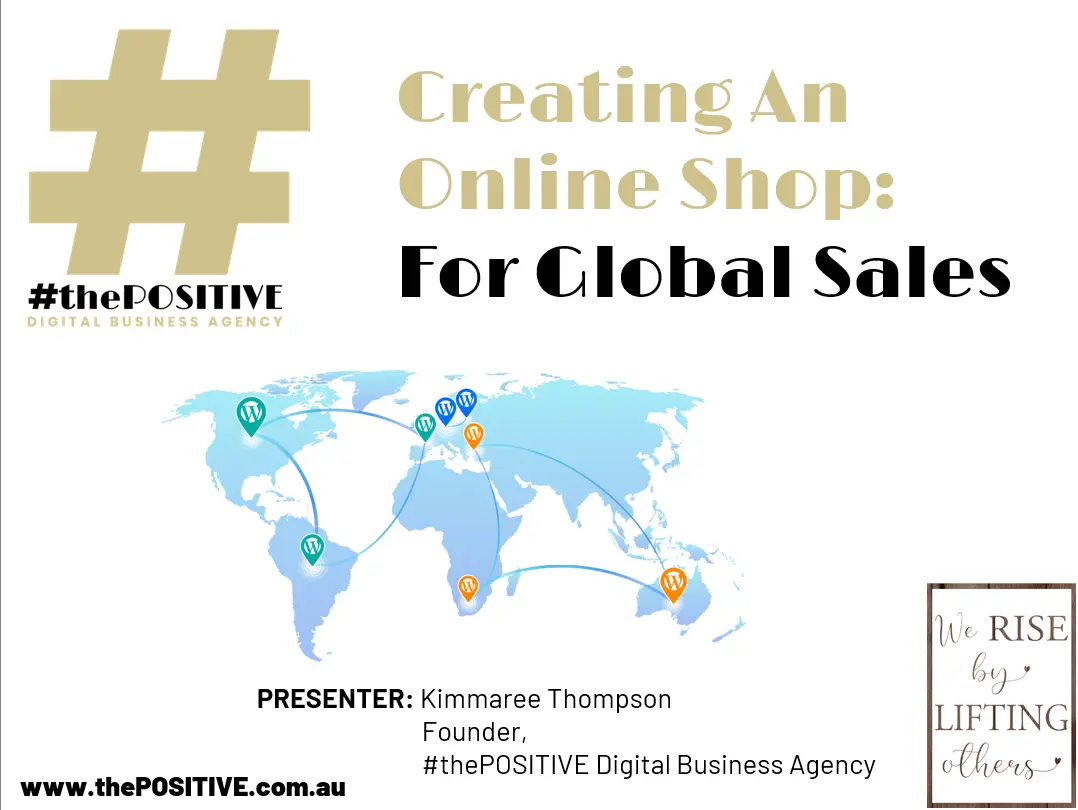
#thePOSITIVE BLOG
Is Your Website Ready For Global Sales?
#digitalbusinessperth #digitalmarketing
DO YOU WANT AN ONLINE SHOP OR WEBSITE FOR GLOBAL SALES?
If you do want your online shop or website to be optimise for global sales, the trick is to make it look like it is a local website … in every market. Tricky? Sometimes this is called having a multilingual or multi-regional website, that terminology can get a bit confusing, especially when you look at a country like Canada where there are multiple languages within the one region.
The reason that you try and make your international website look like a local website, in every location, is that being successful in new locations is primarily a SEO issue. You want your products and services to rank in the local search engine somewhere in the top 10, hopefully top 3, items that will be seen when a local person types their request into the search engine.
As any successful ecommerce store owner will tell you, making sales online is all about presenting clients and prospects with the purchase journey with the least amount of friction, the least number of barriers between their intent to purchase and your intent to supply.
Even if you are not ready to start paying Google for advertising in 15 countries right now, it can be helpful to consider what will be required as you grow your website, so that when you are ready to expand into offshore markets you would have built your infrastructure in a way that can more easily accommodate the change.
In most cases Australian organisations do not expand into every market from Russia to China and Iran as their first move, they tend to optimise for the low hanging fruit like America and England first them move onto the more complex markets.
Therefore Insightful blog for Australian business owners on critical steps for expanding online businesses international markets.
GLOBAL SALES WEBSITES, WHAT ARE THE KEY POINTS OF DIFFERENCE?
Kimmaree Thompson recommends business owners prioritise three areas when they are optimising their website for global sales:
- Local Regulations
- Client Geo-diversity
- Technical issues
We will go into each of the three areas in some detail.

HOW DO LOCAL REGULATIONS IMPACT GLOBAL WEBSITE DESIGN?
The reason we say a global website needs to look like a local website is that the local search engine will be looking to tick off the basics as part of its algorithm. If all the local websites have a feature that you do not have, because the regulation is not local to your business, that is a red flag that you are not local and your site will be push down the search engine rankings.
At this time the major local regulations that can significantly impact rankings focus on Data and Privacy provisions. That said, Accessibility is fast moving up the ranks as a deal breaker for search engine algorithms.
When we are talking about local regulations, the regulations may be local withing a State or local within a Country. An example of that is the California Consumer Privacy Act (CCPA), this is primarily a legislation focusing on consent for Cookies on your website. Furthermore this legislation does not apply in Texas or other states in the USA, just California. “Just California” is a bit of an understatement, it is the largest economic centre within the USA – you will be missing out on a lot of US sales if your website is not compliant with the state specific regulations. When the search engine algorithm is analysing your website if it cannot find a request to consent to cookies you will be pushe down in the California rankings … your website does not “look local” to the algorithm.
Navigating International Regulations and Accessibility
Some of the other major international regulations that are currently driving changes to Australian websites include the European Union’s General Data Protection Regulation (GDPR) and the Japanese Act on the Protection of Personal Information, with it’s focus on a Mandatory Privacy Policy. If you are looking to rank in the Chinese market, then you need to get your website registered with the government and display your registration number.
As I mentioned earlier, here in 2023 the emerging issue that is next likely to hit the search engine algorithm is Accessibility. Canada, China, the EU, Japan, and the U.K. currently have mandatory accessibility legislation & compliance requirements, the impact of this emerging legislation is so far not that significant but you can anticipate that it will be the next area that will start to hit your search engine rankings, not to mention evolve into a real online reputation management (ORM) issue.
The Americans with Disabilities Act (ADA) made headlines when it was use as the foundation of a lawsuit against Taco Bell. After the COVID lockdowns, we can all visualise a small Australian town with only one supermarket getting caught up in a lawsuit when the three people with visual disabilities are the only people in town who cannot order their groceries online for delivery.
We do not know what the next COVID-style event may be but none of us want the online reputation management (ORM) fall out of having our website not being reasonably accessible to people with disabilities.
HOW DOES CLIENT GEO-DIVERSITY IMPACT GLOBAL WEBSITE DESIGN?
The three main areas that client geo-diversity can hit your search engine rankings is:
- Audience targeting
- Payment Options
- Buyer intent
The first thing we think about here is language, seems simple that you just offer your website in multiple languages, rip it through the Google translatory and your done .. Tra! La! If only.
If you think about Canada, and many parts of Europe, one geo-location has more than one primary language. Being an Aussie, you will know that we all speak English .. but do we? Will the Americans know what you can buy when you are shopping at Macca’s? Spread that local diversity across multiple languages and it is often better to get locals to rewrite your website content for you as the words that the locals use when they type something into the local search engine is entirely different to what your Australian clients would type into Google.
Adapting to Local Search Engines and Payment Preferences
On the issue of local search engines, if you are in Australia, USA, UK and Canada optimising for Google just makes sense – it represents over 70% of the search engine client requests but if you are hoping to sell into Asia or Russia or China then optimising for Google search engine algorithm may be a waste of your time … because the locals do not use Google! In Russia the locals tend to search on Yandex and in China the search engine of choice is Baidu.
Same goes for payment options, Australia, USA, Canada and UK, all is good with Stripe and PayPal as your core offering but outside of these markets the locals will not be regularly paying using these payment processing systems. Asking them to pay with a system that they are not familiar with will introduce a barrier to your client journey. You need to expand your payment processing options to what ever it is that the locals use. The least number of friction points between the client’s intent to buy and your intent to sell is the goal.
WHAT ARE THE MAJOR TECHNICAL ISSUES FOR GLOBAL WEBSITE DESIGN?
From a technical perspective, the four key areas Kimmaree Thompson suggests website owners focus on for optimal global website performance include:
- Search engine geo-targeting
- Website hosting
- Website maintenance
- Language
Search engine geo-targeting could be said to be what this whole blog post is about, but there is more! If you think it is difficult working out how to serve up different pages on the same product to different audiences … think how hard it is for a search engine to work out what page of essentially the same content to deliver to a client.
One of the ways website developers work to help search engines deliver the right content to the right client is through the use of hreflang tags, sounds weird but is very useful. A hreflang tag is a HTML attribute that specifies the geographic area and language of a webpage. It’s used to differentiate similar web pages aimed at different audiences so that search engines will not accidently penalise your website for having duplicate content.
In addition to the unusual sounding technical issues, there are other things you will most likely know about but may not have on your changes list like:
- Date formatting, we use day/month/year, in the US it is more often Month/Day/Year
- Measurements cm v inches or kg v pounds
- Currency indicators
As a website owner, you will need to consider if you are going to focus on a non-geo domain ie .com or have individual local domains ie .com.au or .uk.co. If you decide to go for a non-geo domain, you may like to help the local search engine as you may see if you visit the UK based Guardian website, in Australia their website comes up as https://www.theguardian.com/au, even if you just type in https://www.theguardian.com/ you will be redirected to the local website.
Maximizing Your Global Online Presence
As we have been talking about appearing local being at the core of optimising your website for global sales, we cannot avoid talking about your website hosting. Where your website is hosted affects the speed, how fast you load when the link to your website is clicked. Optimally you would have your local website hosted locally but practically many global sites use a CDN (Content Delivery Network) service like Cloudflare that has multiple servers, all around the world and can maintain a mirror version of your website in multiple locations and server up the content from the closest server.
There may be a slight penalty if you use a CDN and they do not have a local server but it needs to be played against the risk of your entire global network going down if you only have your website hosted on one server – that is why most tend towards the CDN, it is just risk management.
We have already touched on working with multi-language websites, it is not enough to have your content in multiple languages. In many cases, you may need to serve the same content in multiple languages in the one location. In Canada it is pretty much two languages across the whole country but when you get into Europe you may need to server up your content in four languages in the one location.
I always like to provide a where to go to next link for additional support. Hubspot has a lot of useful resources, even if you are not a Hubspot user. If you would like to dive deeper you may like this article their 2023 take on a Global Website SEO, they also have a downloadable SEO Audit that could be useful.

HOW WE GOT TO WRITING THIS BLOG POST
The Belmont Business Enterprise Centre is currently supporting Western Australian business owners by delivering a range of workshops to help them start to export their goods and services. As part of this project, Kimmaree Thompson, Principal here at #thePOSITIVE was asked to do a presentation the things to focus on if you are getting your website ready for Global Sales.
The feedback has been that the information was useful for business owners where were not yet ready to export but hoped to be one day, as well as the people who were ready to get into exporting right now. Kimmaree wrote this blog post to share the core information with a wider audience.
Author: Kimmaree Thompson | First Published 7 Mar 2023

RELATED PRODUCTS & SERVICES
During 2023 we will be running a public Online Reputation Management Group Coaching Masterclass, please email if you would like to be put on the Early Bird List to get advice when we will be running that program on a group basis. We also offer Personalised Online Reputation Management Executive Coaching and In-house Online Reputation Management workshops. Book your free initial consultation to explore what options will work best for your organisation.
Websites, SEO & Marketing
RELATED HASHTAGS
#digitalbusiness #Google #SEO #SearchEngineOptimisation #GoogleAdvertising #digitalbusinessperth #digitalmarketing #digitalagency
#business #businessowner #entrepreneur #womeninbusiness #businesswoman #businessman #businesstips #smallbusiness #girlboss #businessowners #businesslife #entrepreneurship #womenempowerment #success #entrepreneurlife #motivation #businessminded #womensupportingwomen #femaleentrepreneur #businessopportunity #womeninbiz #womeninbusiness #PerthSmallBusiness #Perth #Fremante #Kalgoorlie #Rockingham #Mandurah #Bunbury #Busselton #MargaretRiver #thePositive
#supportsmallbusiness #handmade #shoplocal #shopsmall #smallbusinessowner #trep #supportlocal #business
#localbusiness #etsy #marketing #businessowner #womenownedbusiness #womeninbusiness
Digital Marketing Perth | Perthnow | Perthwa | soPerth | Social Media Perth | Digital Marketing Agency Perth | Small Business Coaching Perth
Stay
Connected
Promotions, Discounts, Coupons? Lets stay connected and we will keep you in the loop and offer you our best priced deals first!
We only contact our database once every 4-6 weeks and do not sell or share our subscriber details.

